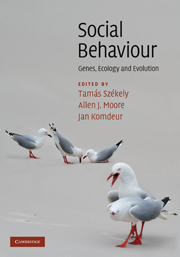Book contents
- Frontmatter
- Contents
- List of contributors
- Introduction: The uphill climb of sociobiology: towards a new synthesis
- Profile: Undiminished passion
- Part I Foundations
- 1 Nature–nurture interactions
- Profile: Social evolution, sexual intrigue and serendipity
- 2 The quantitative genetics of social behaviour
- Profile: Mating systems: integrating sexual conflict and ecology
- 3 Social behaviour and bird song from a neural and endocrine perspective
- Profile: In love with Ropalidia marginata: 34 years, and still going strong
- 4 Evolutionary game theory
- Profile: The huddler's dilemma: a cold shoulder or a warm inner glow
- 5 Recent advances in comparative methods
- Profile: Multi-component signals in ant communication
- 6 Social evolution theory: a review of methods and approaches
- Profile: What's wrong with this picture?
- Part II Themes
- Part III Implications
- Species index
- Subject index
- References
Profile: Mating systems: integrating sexual conflict and ecology
Published online by Cambridge University Press: 05 June 2012
- Frontmatter
- Contents
- List of contributors
- Introduction: The uphill climb of sociobiology: towards a new synthesis
- Profile: Undiminished passion
- Part I Foundations
- 1 Nature–nurture interactions
- Profile: Social evolution, sexual intrigue and serendipity
- 2 The quantitative genetics of social behaviour
- Profile: Mating systems: integrating sexual conflict and ecology
- 3 Social behaviour and bird song from a neural and endocrine perspective
- Profile: In love with Ropalidia marginata: 34 years, and still going strong
- 4 Evolutionary game theory
- Profile: The huddler's dilemma: a cold shoulder or a warm inner glow
- 5 Recent advances in comparative methods
- Profile: Multi-component signals in ant communication
- 6 Social evolution theory: a review of methods and approaches
- Profile: What's wrong with this picture?
- Part II Themes
- Part III Implications
- Species index
- Subject index
- References
Summary
When I began as a research student in 1973, the key to understanding mating systems was thought to be through a study of ecology. My bible was David Lack's recent book (1968), which showed how variation in bird mating systems could be linked to differences in the type, abundance and dispersion of resources, such as food and nest sites. Lack concluded that most bird species were monogamous because a male and female each maximised their reproductive success if they cooperated to rear a brood together. Two quotes from Lack's book convey the prevailing view of that time: a comparative approach was needed rather than experiments because ‘no one has yet found how to make a monogamous species polygynous’ (p. 8); ‘given that the marvellous adaptations of the brood parasites are a product of natural selection, it is … hard to concede that this same powerful force is likewise responsible for the dull, conventional habits of the monogamous song birds which raise their own young’ (p. 97).
Two changes heralded a revolution during the next decade. The first was a new idea, namely the recognition of sexual conflict in mating and parental care (Trivers 1972, Parker 1979). The second was a new technique, namely DNA profiles for assigning parentage with precision. A new idea and a new technique was an inspiring combination for a fresh look at bird mating systems.
Information
- Type
- Chapter
- Information
- Social BehaviourGenes, Ecology and Evolution, pp. 55 - 58Publisher: Cambridge University PressPrint publication year: 2010
